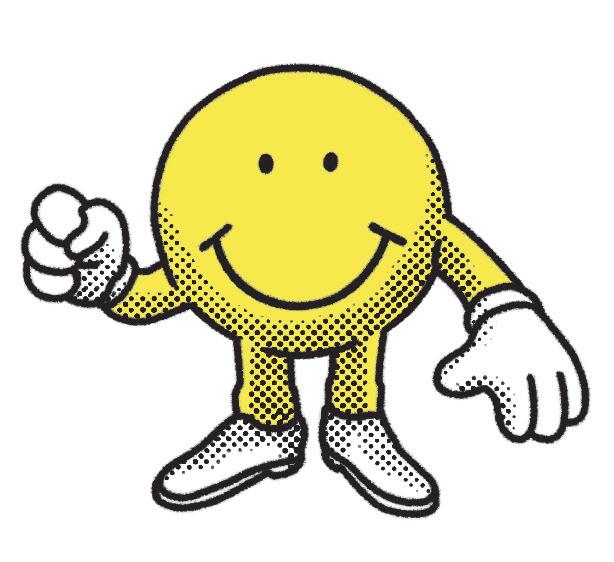
16 minute read
LET'S KEEP CLINGING TO HOPE.
When I was little, I carried around a smiley face toy I got from a quarter machine in a grocery store. It had a smooth plastic body with the classic yellow smiling sphere, as well as arms and legs with white-gloved hands and little white sneakers. Upon numerous present-day Google searches, I still don’t know what these toys are actually called, but I named mine Smiley Guy, and for all intents and purposes, he was my first emotional support figure.
Cute anecdotes aside, the real metaphor is: I have clutched at an enduring token of hope for as long as I can remember.
Despite this, I have still found myself at the perils of panic attacks, debilitated by depressive episodes — and now, like many other “chatty and overachieving” women in my age group — diagnosed with ADHD (and continuously investigating my neurodivergent brain in even greater capacity). Mental health has been at the forefront of my identity since I could understand what mental health is, and every day I toe the fine line of not letting these facets of my experience define me and simultaneously embracing that they make me who I am.
This issue of the Goodnewspaper is a love letter to everyone who experiences that complex reality. We all have mental health, just like we all have physical health, but so many of us face these elements of our humanity in completely unique, sometimes dysregulated, or overwhelming ways. We care so much about the world around us, the world within us, and the world that could be, and we deserve the tools, narratives, and practices we need to best enjoy this messy, marvelous, multifaceted existence.
This paper includes stories about all kinds of people, organizations, and initiatives that help us reframe mental health and help one another heal. Whether it’s examining the future of crisis and community care, using art museums to help treat anxiety, our guide to DIY self-care kits, or my personal career-highlight interview with Gemma Styles about mental health in the digital age, we hope this issue of the paper makes you feel seen, supported, and energized to keep going.
There are lots of things that provide hope every day; from the love of a pet, to the breeze in the trees, but my wish is that this newspaper can serve as a physical manifestation of the belief in a brighter tomorrow — that it can serve as one of the Smiley Guys we all cling to with the persistent belief that there is always more good to behold.
Healing and hoping alongside you all,
— KAMRIN BAKER, @ KAMSTAGRAMS Managing Editor, Goodnewspaper
WHO MAKES THE GOODNEWSPAPER ?
Editor-in-Chief
Branden Harvey - @brandenharvey
Managing Editor
Kamrin Baker - @kamstagrams
Junior Editor
Amanda R. Martinez - @amandarmartinez
Art Director
Johnathan Huang - @jhuangstudio
Director of Community & Creative
Megan Burns - @meganburnsyou
Communications Manager
Margaux Madamba - @msdm.x
TikTok Content Creator
Jessica Irvin - @jessicairvin
Centerfold Poster Artist
Kyndra Bailey - @kynyoubelieveit
Get Good News In Your News Feed
Join 366,000+ inspiring people who get good news from Good Good Good on Instagram, TikTok, Facebook, and Pinterest at @goodgoodgoodco
Read more good news daily at goodgoodgood.org and get good news delivered to your inbox via the Goodnewsletter at goodgoodgood.org/goodnewsletter
This issue of the Goodnewspaper was printed in January 2022 and released in February 2023 Every issue is designed to be evergreen so you can read and share good news all year round.
Read and share good news and find ways to do good on our website at goodgoodgood.org
Shop our most popular back issues, apparel, and more at shop.goodgoodgood.co
For details on advertising or wholesale, please visit goodgoodgood.org/partnerships
Easily update your subscription and shipping information at goodgoodgood.org/home
We want to hear from you. Send your feedback and questions at goodgoodgood.org/contact
Share good news and get rewarded as a GGG Ambassador at goodgoodgood.org/affiliate
Emotions Matter Makes A Difference For Folks Affected By Borderline Personality Disorder
Borderline Personality Disorder (BPD) is a mental health condition characterized by difficulties regulating emotions. Someone with BPD might experience intense and extended emotions that can lead to impulsivity, poor self-image, relationship challenges, and dangerous behaviors like self-injury. However, those living with the condition and the people who love them want the world to know: those big emotions matter.
Emotions Matter is a nonprofit that was created by a network of families and individuals impacted by BPD who have united around a shared vision to improve social connection, awareness, and healthcare systems for those living with the condition.
The organization was established in 2015 when three women connected at an awareness walk and bonded over their shared experiences with family members who live with BPD. Since then, Emotions Matter has established services including a peer-to-peer online support group, educational materials, treatment resources, loss support groups, a non-judgmental network of clinicians, and political advocacy efforts to improve BPD research, treatment, and access to care.
The National Alliance on Mental Illness estimates that 1.4% of the adult U.S. population experiences BPD. In 2021, Emotions Matter served an estimated 1,700 people through person-centered and stigma-free programs.
“The most helpful people in my recovery have been people like those in this group who have been supportive and empowered me to keep believing in myself and not feel ashamed for what diagnosis I carry,” a testimony from a woman named Chelsea reads on the Emotions Matter website. “There is always hope. There is always love and acceptance to be given. Make sure to look for it.”
Learn more: emotionsmatterbpd.org
Experts Points To Psychological First Aid Training As A Way To Boost Care Workers’ Wellbeing

When the World Health Organization introduced Psychological First Aid (PFA) over a decade ago, it was the first globally recommended training for people like healthcare workers to provide psychological care in the immediate aftermath of an emergency event.
Now, researchers have identified it as a tool to help care workers and first responders themselves.
In June 2020, the UK government introduced free access to digital PFA training to support frontline workers, especially those working in care homes and retirement facilities. This led to a study by scientists from Northumbria University and the University of Highlands and Islands, which indicated that those who had taken the PFA training were better equipped to overcome stress and improve relationships with others.
Dr. Mariyana Schoultz, the project lead from Northumbria University, shared that the study suggests that PFA has the potential to minimize the risks of PTSD and other ongoing psychological conditions in healthcare workers, though more research is required.
“Findings suggest that PFA training has the potential to strengthen resilience for staff in health and social care, promote anti-stigma messages, and normalize health-seeking behavior,” Schoultz told Science Daily. “We, therefore, recommend that consideration be given to funding an integrated program of research and development to further develop, implement and evaluate a co-produced iteration of PFA for the use in the UK care sector and beyond.”
How To Be Intersectional In Your Mental Health Advocacy
Good
Many people experience mental health conditions as a result of systemic oppression. Check out “The Side Effects of Living” by Jhilmil Breckenridge and Namarita Kathait to read about diverse lived experiences.
Meet The Transgender Nutrition Therapist Helping People Of All Genders Heal From Eating Disorders
Registered dietician Vaughn Darst knows what it’s like to experience dysphoria in his body. His own experience as a trans person informs his knowledge of the unique challenges transgender folks encounter when seeking peace with their bodies, nutrition, and gender identities.
According to Penn Medicine, transgender teens face a greater risk of eating disorders compared to their cisgender peers, and they face additional hurdles to diagnosis and treatment due to stigma and discrimination. Darst also shared in his 2019 TEDxUSC talk, among gender-nonconforming youth who have an eating disorder, three out of four will also deal with self-harm or thoughts of suicide.
“The problem is that the world is shaped by gender and fatphobia and transphobia. I am not the problem,” Darst says in their TEDx Talk. “Those of us who discover this secret can exit the cycle of self-harm to an incredible place of strength and resilience. I am one example of this. I use my strength in service of my community.”
Through affirming care and body liberation, Darst started his nutrition therapy practice, All Gender Nutrition Their work is based on intuitive eating and weight-neutral frameworks, working collaboratively with clients and their treatment teams to prioritize individualized healing (all without ever encouraging anyone to lose weight).
“I believe that existing as a transgender person is a radial and revolutionary act, compounded by the effort to resist shrinking ourselves,” Darst writes on their website. “We all deserve community and emotional support to strive to live our most authentic lives in our bodies.”
Learn more: allgendernutrition.com.
BETTER
Redistribute your wealth to: We R Native (wernative.org), Trans Lifeline (translifeline.org), Asian Mental Health Project (asianmentalhealthproject.com), or The Loveland Foundation (thelovelandfoundation.org).
Studies Show That Being Around Birds Is Linked To Lasting Mental Health Benefits
Scientists at King’s College London are giving a whole new meaning to “bird brain.”
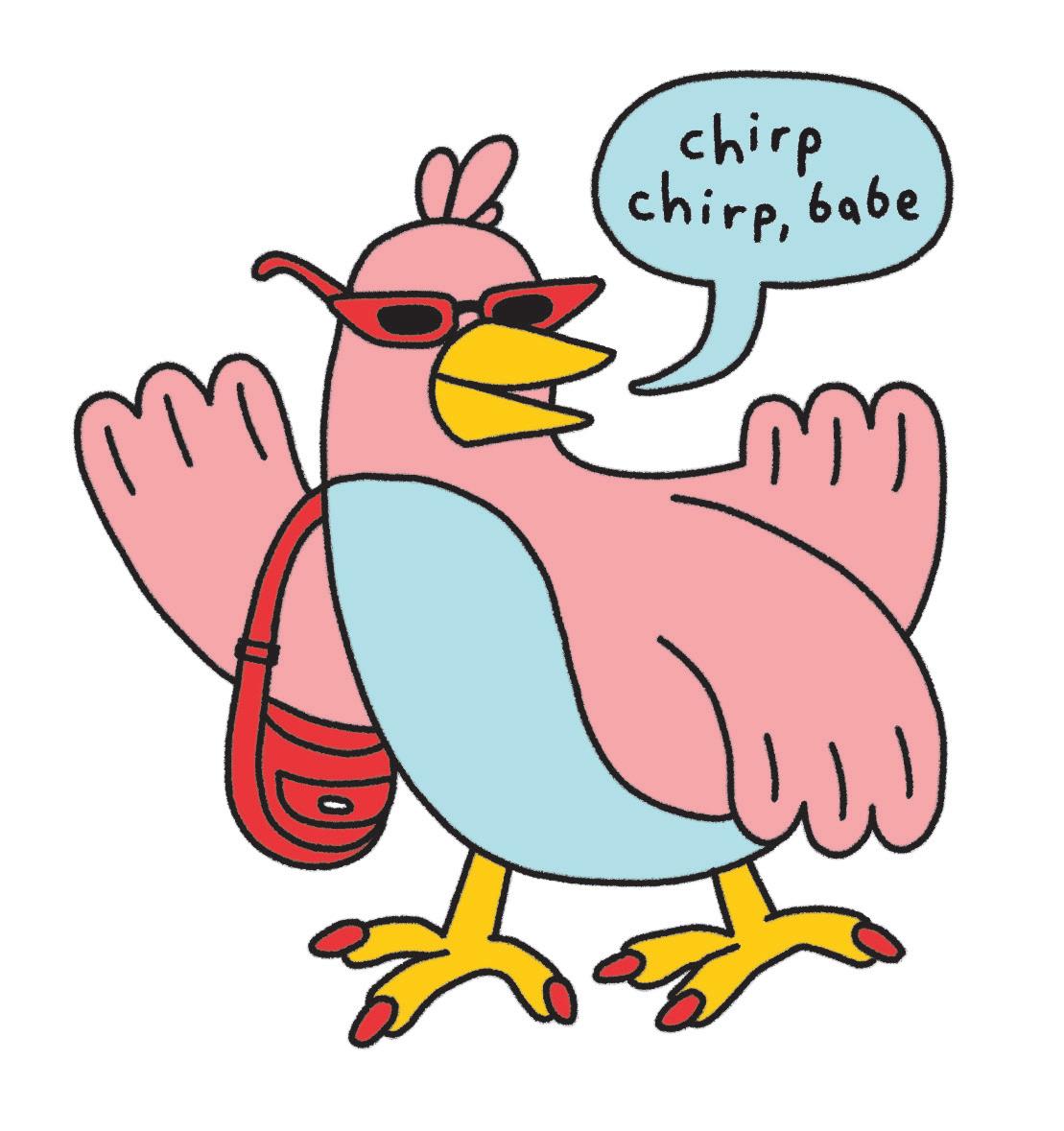
New research has found that seeing or hearing birds is associated with an improvement in mental wellbeing that can last up to eight hours, according to Science Daily.
The study took place over the course of about three years, as 1,292 participants used a smartphone app to chart their mental wellbeing alongside their reports of seeing or hearing birds. The app asked participants three times a day if they could see or hear birds, followed by questions about their mental wellbeing. Researchers also collected data about the participants’ existing mental health conditions.
This led researchers to find that birds had an impact on mental health improvements for both “healthy” folks and those with preexisting conditions like depression. While many of us likely already enjoy the beauty of nature — whether it’s babbling brooks, chirpy songbirds, or a vibrant sunset — this research bolsters those feel-good sensations with tangible science.
Lead author Ryan Hammoud, a research assistant at the Institute of Psychiatry, Psychology & Neuroscience at King’s College London said: “We have, for the first time, shown the direct link between seeing or hearing birds and positive mood. We hope this evidence can demonstrate the importance of protecting and providing environments to encourage birds, not only for biodiversity but for our mental health.”
How To Support Mental Health Research
Harvard Researchers Have Discovered A Major Breakthrough In Detecting Bipolar Disorder
Bipolar disorder is a heritable mood disorder that impacts about 2.8% of Americans. There are four categorized types of bipolar disorder, according to the National Alliance on Mental Illness, each pointing to various patterns of depression, mania, and other unstable moods.
The main treatment for the condition is lithium, though it doesn’t help all patients and comes with significant side effects. However, a genetic study led by scientists at Harvard Medical School and the Broad Institute of MIT and Harvard has revealed new key genetic insights that could help detect, diagnose, and treat bipolar disorder.
The international study, which included 14,000 participants with bipolar disorder, and 14,000 control participants, pinpoints a gene called AKAP-11 as a strong risk factor for both bipolar disorder and schizophrenia. These findings not only help researchers understand the molecular makeup of the disorder but also provide insights into the efficacy of lithium therapies, thanks to data on the interactions between AKAP-11 and lithium proteins. The results have already kicked off new studies.
“This work is exciting because it’s the first time we’ve had a gene with large-effect mutations for bipolar disorder,” Steven Hyman, the director of the Stanley Center for Psychiatric Research at the Broad Institute said. “Ideally, we’d like to find risk variants across the whole genome, which will give us the very best chance of coming up with treatments for everyone.”
WHAT'S THIS? THIS IS THE GOOD BAR.
We believe in celebrating good and then joining in to make a difference. The Good Bar is full of advice from the Good Good Good community on how to take action. Start small and work your way up.
This Organization Aims To Create A World Where Men Make Mental Health A Priority

Canadian nonprofit HeadsUpGuys started from a simple survey in the waiting room of a doctor’s office. On the survey, men indicated they were having suicidal thoughts, yet failed to mention these thoughts to the doctor they were about to see. This was the catalyst for HeadsUpGuys, an anonymous online resource specifically designed for men living with depression.
Launched in 2015 as a program of the University of British Columbia, HeadsUpGuys is now a global resource to support men as they recover from depression and reduce their risk of suicide, as well as improve mental health literacy and decrease stigma among men.
In this time, over 500,000 “self checks” have been completed on the organization’s website, and dozens of campaigns —including public art and celebrity PSAs —have reached those looking for relief from depression.
HeadsUpGuys is also home to countless resources, informational literature, and tools for friends and family who want to uplift their loved ones. The site reaches 3 million users from around the globe.
“The stigma around men’s mental health is an undeniable one, and there are so many toxic pressures on men to present a certain way no matter how they’re doing,” HeadsUpGuys user Brendan Barlow shares. “Find someone you trust who you can talk to… Let yourself feel how you’re feeling and let yourself be vulnerable. Reach out and hold on.”
Learn more: headsupguys.org
Better
If you like learning about the science of our brains, check out the podcast “The Happiness Lab with Dr. Laurie Santos” — which is based on the most popular course in Yale University history.
Donate to organizations funding mental health research. Some suggestions include OneMind (onemind.org), MQ Mental Health (mqmentalhealth.org), and Brain & Behavior Research Foundation (bbrfoundation.org).
BEST
If you’re eligible and able, enroll in a clinical trial or research study to help advance mental health care, resources, and treatment for all. Visit nimh.nih.gov/health/trials to find a study and learn more.
A Small Business Owner Created A Program To Give Her Mental Health Journals To People For Free This Virtual Reality Leader Is Using Tech To Help Seniors Cope With Isolation & Depression
Kyndra Bailey is a small business owner slinging handprinted apparel, stationery, stickers, and more under the brand Kyn You Believe It.
In 2022, Bailey introduced her line of mental health journals, designed to be an “all-in-one resource for caring for your mind.” The journals feature daily mood trackers and prompts, coloring pages, contact information for one’s support system, and an emergency resource page.
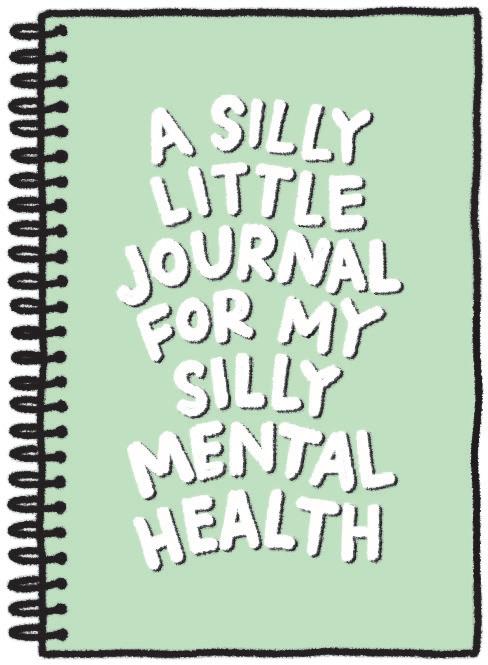
Bailey knew that purchasing a journal would be inaccessible to some, so she started the Write In The Feels program. Anyone who is interested in a journal but cannot afford one is invited to fill out a request form on a no-questions-asked basis. The sales from Bailey’s shop fund these donations, but customers can also independently donate to get journals in the hands of anyone who needs one. Teachers and therapists are also encouraged to download free fliers to help spread the word to folks in need.
So far, Bailey has donated over 300 journals, either to folks that have requested one, or to local organizations in her community. She is also working on applying for nonprofit status for Write In The Feels.
“I hope the journals can be a stepping stone in beginning to get the mental health care that everyone deserves, or be a continuation of that care in instances where people may no longer have access for one reason or another,” Bailey said. “While the journals aren’t a replacement for mental health care, I do believe they can be an important component. Having the space to identify things like self-care habits, feelings, and the source of those feelings is something everyone deserves.”
Learn more: writeinthefeels.com
Good
Follow art therapist Amelia Hutchison on Instagram or TikTok for tips and tutorials to integrate art into your therapy and healing practices. Check her out at @art_therapy_irl on both platforms!
In 2017, two years before she graduated college, Carleigh Berryman had an idea to revolutionize mental wellness for seniors — virtual reality that makes “aging more engaging.”
She started her company Viva Vita, and prior to the pandemic, brought her VR kits to senior living communities, memory care centers, adult day health centers, and hospices. Once COVID-19 came into play, Berryman had to adjust the program to be conducted while social distancing.
Now, Viva Vita distributes VR kits for senior care facilities and homes, as well as guided tours that caregivers can easily conduct without the help of a facilitator.
“These older generations are not always paid the attention they deserve or given that respect or that care they really need. And I think it’s our responsibility, regardless of our age, to take care of those people,” Berryman said on the TODAY Show. “I feel like I have 100 grandparents.”
Viva Vita works with small, independent teams across the globe to film 360-degree content of beautiful locations that pair with VR tech. Seniors can tour the Eiffel Tower, visit with kangaroos in Australia, or enjoy a calm waterfall.
The impact of VR for seniors includes enhanced cognitive stimulation, engaging physical activity, immersive reminiscence therapy, a heightened quality of life, and even improved medical outcomes.
“Carleigh, in her very gentle way, is such a visionary to want to do something where others can benefit,” Thyme Cave, the director of the Iona Washington Home Center, a facility that uses Viva Vita, said. “I’m just grateful to be a part of this movement.”
Psychiatrists In Brussels Can Now Prescribe Free Museum Visits To Help Treat Anxiety
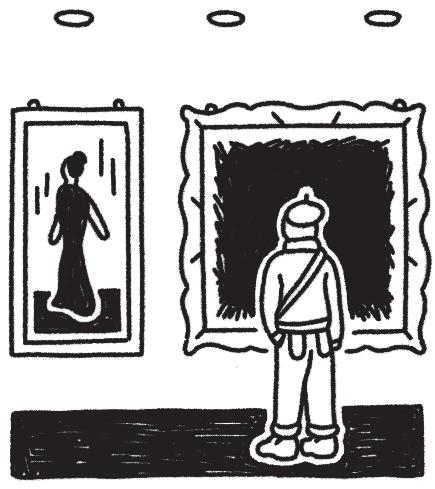
Inspired by existing projects in Canada that issue prescriptions to fine art museums and national parks (park prescriptions are a thing in the U.S, too!), one of the largest hospitals in Brussels has implemented museum therapies for people suffering from depression, stress, or anxiety.
The project is currently running a pilot program for six months, partnering with the city’s history museum, a center for contemporary art, and the fashion and lace museum. Participants can also explore the sewer museum, which allows them to stroll 10 meters underground along the banks of the Senne River.
Doctors stress that these museum prescriptions are not a replacement for other treatments but are a voluntary addition to medication, psychotherapy, and other forms of relaxation. Delphine Houba, a Brussels deputy mayor in charge of culture, told The Guardian that she hopes this gives doctors “a new tool in the healing process.”
The World Health Organization published a review in 2019 that concluded the arts could help people experiencing mental health conditions, urging greater collaboration between culture and public health professionals.
This pilot program is the first of its kind in Europe and aims to do just that. If successful, the arts and culture prescriptions could be expanded to include other museums and cinemas, as well as more hospitals and groups of patients, including those recovering from brain injuries.
“Anything could have therapeutic value if it helps people get a good feeling and get in touch with themselves,” Dr. Johan Newell, a psychiatrist at Brugmann University Hospital, told The Guardian. “Our society is so, so busy, so full of stress and stimuli. A museum prescription gives people an opportunity to settle down for a moment.”
Better
Donate to Write In The Feels to help someone in need access a mental health journal. Visit writeinthefeels.com to donate directly, buy your own journal, or download fliers to advertise the program.
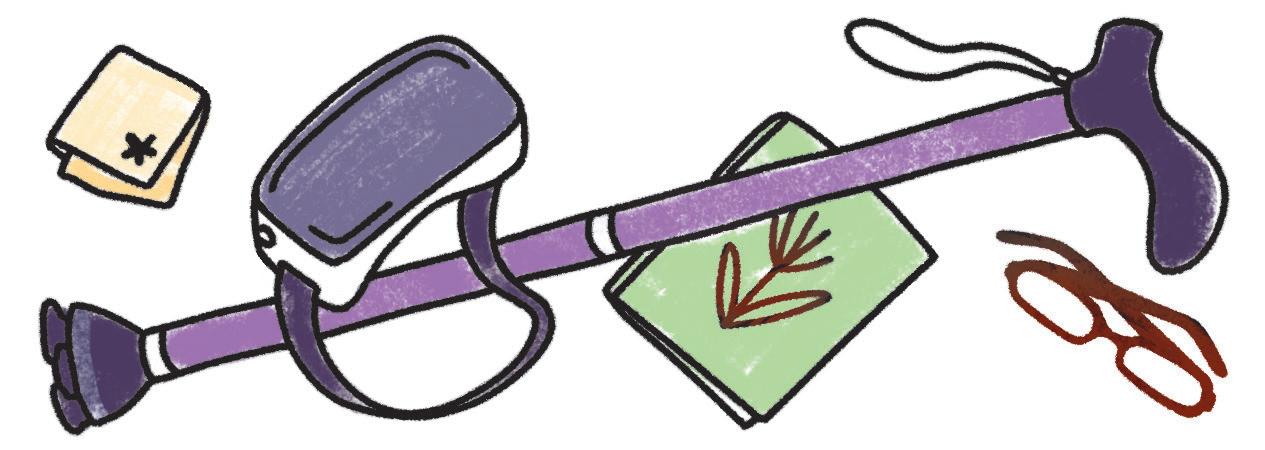
Best
Take care of yourself so you have the capacity to help make a difference. Visit a museum, (many have free admission days!), spend time in nature, or begin a journaling practice of your own.
This Service Provides Nonjudgemental Emotional Care To Support Folks After Getting Abortions
There’s no room for debate: People deserve unconditional bodily autonomy to decide if and when they get to have children. However, sometimes those decisions are complicated and come with a lot of big feelings.
Exhale Pro-Voice is an organization and service that was created in 2000 to support the emotional health and wellbeing of people after their abortions. Founded by people who have had abortions, Exhale Pro-Voice provides — and trains others to provide — nonjudgmental support that welcomes a full range of emotions and respects all belief systems.
Whether users receive support through a direct textline, join a support group, access a myriad of resources (including connections to other similar organizations), or simply help change the culture in how people discuss abortion care and emotional wellbeing, Exhale Pro-Voice is doing the work.
“Our Pro-Voice approach centers each individual’s unique context, family, culture, and abortion experiences,” the website reads. “We follow your lead, hold nuance for you, and support you in tending to your wellbeing in a way that feels best for you. Through this Pro-Voice, abortion-positive approach, we have supported thousands of people.”
Learn more: exhaleprovoice.org
My Affirmation Project Has Brought Healing And Compassion To Over 60 Million People
When artist Nicole Leth lost her father to suicide, her healing took the form of spray-painting words of affirmation anonymously in her small Iowa town. This was the inception of My Affirmation Project, a public art mission that has since reached 60 million people since 2019.
Leth now does this by sending monthly anonymous postcards to 80,000 people for free, and installing messages of hope as public art in the form of roadside billboards, airplane banners, urban wheat-pasted posters, stickers, yard signs, handmade quilts, murals, and more. The best part? All of this has been funded entirely by small donors and sponsors who believe in her mission.
“It became a way for me to alchemize trauma and practice creating beauty out of the hard parts of life,” Leth writes on her website. “It became a way for me to write the words that I needed to hear to help me heal and share them in anonymous and public ways in hopes that they would help other humans heal, too.”
Learn more (and sign up for the free postcard service!): myaffirmationproject.com
Unique Ways To Help Others With Their Mental Health
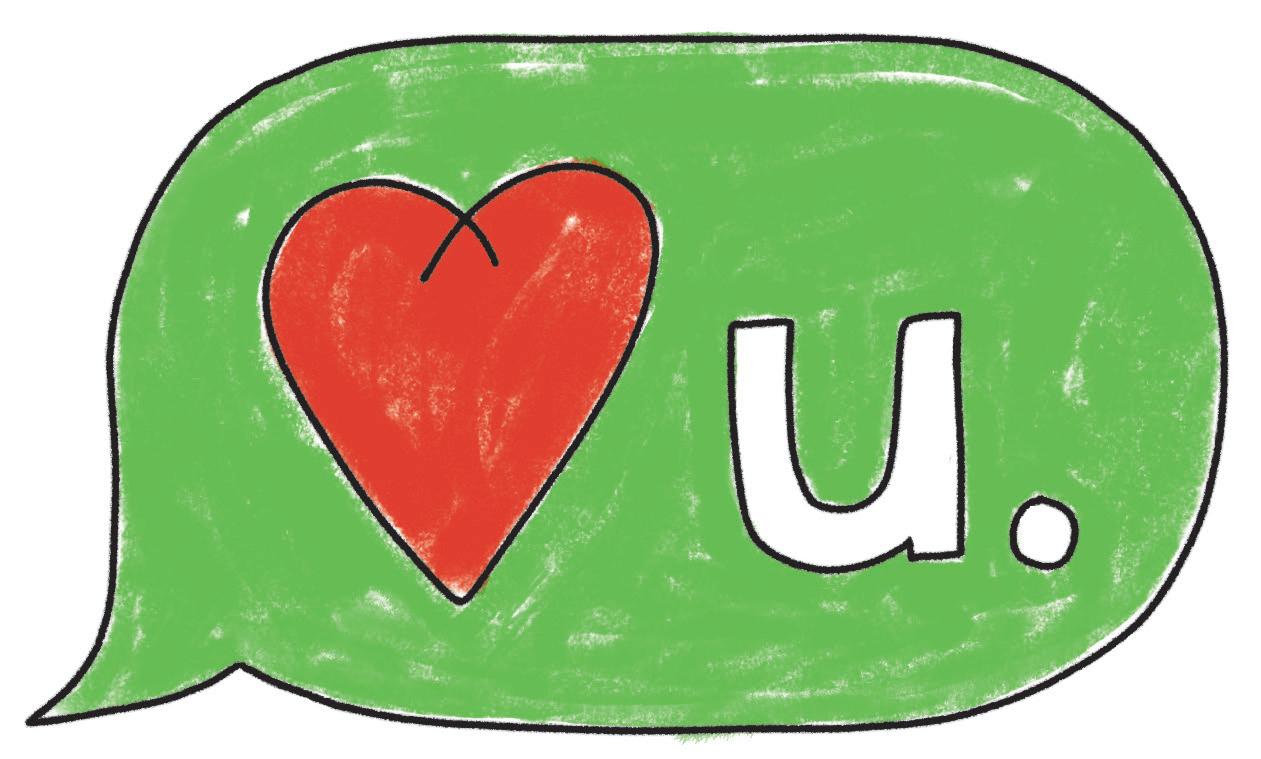
Donate to Support For The Psyche to help folks who can’t afford therapy access care. You can donate funds or buy a t-shirt to help! To support others or share the opportunitiy with someone in need, visit supportforthepsyche.com
The Schizophrenia & Psychosis Action Alliance Is Creating A Movement For Systemic Change
Schizophrenia is a spectrum of neuro-psychiatric brain diseases that cause people to interpret reality abnormally, potentially resulting in hallucinations, delusions, or extremely disordered thinking and behavior that impairs daily life. However, the personal impact of the disease is not the only challenge; stigma is still a very real and ongoing threat to care and social belonging.
It is estimated that 40% of people living with schizophrenia do not have access to treatment, and 6% face homelessness. Moreover, those with the condition require lifelong treatment, and early intervention is key to preventing serious complications.
Schizophrenia & Psychosis Action Alliance (S&PAA) is a nonprofit dedicated to systems transformation, peer-topeer support, and public education to change the narrative around schizophrenia and psychosis.
S&PAA does this work through a number of campaigns. One element in changing the systems that criminalize and dehumanize folks with schizophrenia is by restructuring disease-classification codes. Along with this large-scale advoacy, S&PAA provides support groups (and has since the 1980s) that meet throughout the globe and help those with schizophrenia and their loved ones find ongoing support. Additionally, the organization’s website includes a number of toolkits for diagnosed clients and caregivers alike. It also aims to address barriers to treatment and care in medical, criminal justice, and employment systems.
“People with schizophrenia have been carved out of the medical system — because schizophrenia isn’t viewed as a medical condition. We treat the symptoms, the disease. It is systemic negligence,” S&PAA’s website reads. “People with schizophrenia have the right to effective medicines, social support and housing, and recognition that they are people who want to live and thrive.”
BETTER
Tell your story to help others know they’re not alone. Read and share through The National Alliance on Mental Illness (nami.org/share-your-story) and The Solidarity Stories (thesolidaritystories.com).

BEST
Become






